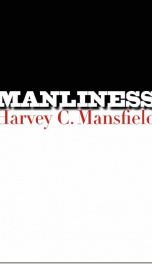Manliness

Harvard government professor Mansfield delves into philosophy, literature and science to define manliness and to argue that it should have a place in an increasingly non-gender-specific society. Throughout, Mansfield clearly states his intentions, and though he may have convinced himself he accomplished his goals, readers will be skeptical; when, for example, he sets out to "elevate manliness from aggression to assertion and thereby discover its connection to politics," he jumps from Hemingway to Achilles before posing a question that has little more than a thin patina of importance: "In our time there are many who say that heroes lack humanity and few who will admit that humanity needs heroes. But at all times heroes have to assert themselves. The question is, what is in it for us?" Similar murky questions and non-sequitur lines of logic continue throughout: "Man has fearsome powers of wisdom and fire over beasts. All beasts fear fire, which perhaps represents the Promethean gift of technology." This clunky chain of supposition is followed by a brief foray into The Jungle Book. But Mansfield's theories on gender equality are likely to create the most conversation: "women are the weaker sex," "women's bodies are made to attract and to please men" and "now that women are equal, they should be able to accept being told that they aren't, quite" all appear on the same page. Mansfield set out to write a provocative book, but ended up penning a juvenile screed.
Info about the book
Author:
Series:
Unknown
ASIN:
B0085SG8FA
Rating:
3.5/5 (2)Your rating:
0/5
Languge:
English
Users who have this book
Users who want this book
What readers are saying
What do you think? Write your own comment on this book!
write a commentGenre
if you like Manliness try:
Other books by this author
Do you want to read a book that interests you? It’s EASY!
Create an account and send a request for reading to other users on the Webpage of the book!

